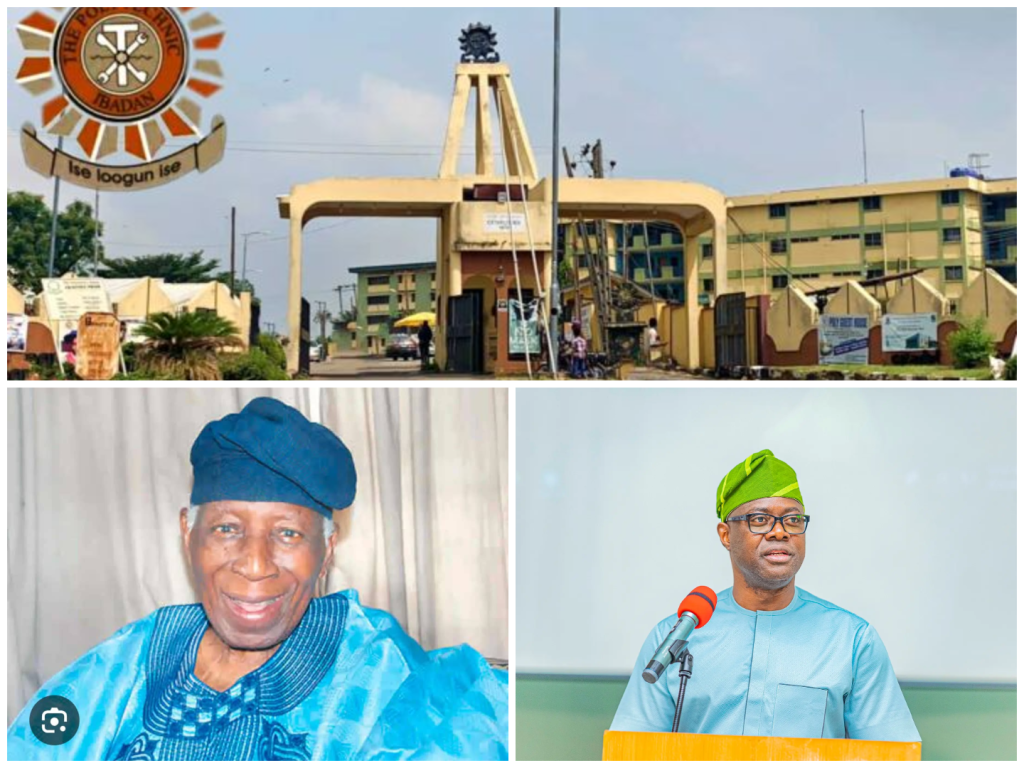Plans by Oyo State Governor Seyi Makinde to rename The Polytechnic Ibadan after the late former governor, Dr Victor Omololu Olunloyo, have sparked a wave of divergent reactions from students, alumni, civil society groups, and prominent Ibadan indigenes.
Dr Olunloyo, a revered mathematician and the first Ibadan indigene to govern the old Oyo State, passed away on 6 April 2025.
He served briefly as governor from 1 October to 31 December 1983 and was the pioneer principal of The Polytechnic Ibadan.
In honour of his legacy, Governor Makinde recently announced plans to rename the institution Victor Omololu Olunloyo Polytechnic, Ibadan.
According to the governor, Olunloyo lived an impactful life, and his contribution to the state could not be captured in a single sentence.
However, this move has ignited widespread resistance.
Students, Alumni protest, block roads
On Tuesday, hundreds of students from The Polytechnic Ibadan staged a protest, effectively grounding movement along the ever-busy Sango-Eleyele Road in Ibadan.
The students blocked the entrance gates of the institution and halted vehicular traffic, leaving many commuters and staff stranded.
In a strongly worded statement, the Students’ Union Government (SUG) described the renaming as “unjustifiable and degrading.”
“For over 50 years, The Polytechnic Ibadan has been a beacon of academic excellence,” renaming the institution would erase its identity and legacy, causing irreparable harm to its reputation and alumni,” said SUG President Olamide Oladipupo.
The SUG urged Governor Makinde to reconsider the decision and open dialogue with stakeholders to explore alternative ways of honouring the late governor.
Civil society group: “Symbolic gesture won’t solve real issues”
The Campaign for Democratic and Workers’ Rights (CDWR), Oyo State chapter, also criticised the move, calling it a “mere symbolic gesture” that does not address the structural and operational challenges facing the institution.
“The Polytechnic Ibadan needs comprehensive reform, not a change of name,” said CDWR coordinator Abiodun Bamigboye.
The group called for increased funding, infrastructural rehabilitation, democratic governance, and improved welfare for staff and students.
It also condemned the alleged casualisation of over 80% of the institution’s workforce and accused the administration of stifling union activities and repressing dissent.
“The renaming exercise will remain a hollow symbolic gesture, disconnected from the urgent realities on the ground,” Bamigboye stated.
Prominent Ibadan leader appeals to Makinde
Former President-General of the Central Council of Ibadan Indigenes (CCII), Chief Adeyemi Soladoye, has added his voice to the growing calls for the governor to rescind the decision.
Soladoye, who is also an alumnus of the institution, warned Makinde not to be misled by “political jobbers,” noting that The Polytechnic Ibadan was founded in 1972 as an institution for the old Western Region and not just Ibadan.
“The Polytechnic Ibadan is a legacy of the entire Western Region, to rename it in honour of one individual, no matter how accomplished, is to downgrade its status,” Soladoye said.
He reminded the governor of the national and continental recognition the institution commands and cautioned that the change would cause emotional disconnection among millions of Nigerians with ties to the school.
Soladoye drew parallels with the reversal of similar decisions in the past, including President Goodluck Jonathan’s aborted renaming of the University of Lagos and urged Makinde to follow that precedent.
Critics also raised concerns over the financial implications of a name change amidst widespread economic hardship. Soladoye said that the cost of altering institutional records and documents was unnecessary at a time of heightened hunger and poverty.
“Makinde has already named the new park and garden at the upgraded Ibadan airport after Dr Olunloyo, to now rename The Polytechnic as well would amount to overkill,” Soladoye added.
While some individuals view the move as a well-meaning tribute to a distinguished son of Ibadan, the overwhelming sentiment among students, civil society, and notable community leaders suggests that the renaming has struck a nerve.
Supporters of the name change argue that Dr Olunloyo’s contributions to education and governance in Oyo State are worthy of such an honour.
But opponents insist that preserving the institution’s original name upholds a broader legacy tied to regional development and collective identity.



